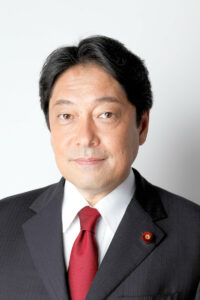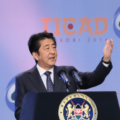Challenges for Strengthening the Japan-US Alliance: Japanese Role Questions through Japan-US “Integration”
Sixty years have passed since the Japan-US Security Treaty entered into force. The Alliance has transformed as the times have changed. With the rise of China, the alliance is again in a new stage.
Onodera Itsunori, Member of the House of Representatives,
Chairperson, Research Commission on National Security of the Liberal Democratic Party of
Japan
―― Sixty years have passed since the Japan-US Security Treaty entered into force.

Onodera Itsunori
Member of the House of Representatives, Chairperson, Research Commission on National Security of the Liberal Democratic Party of Japan
Onodera Itsunori: As an agreement that would become the foundation for the Japan-US Alliance, the basis for Japan’s national security, there is no mistaking that the Japan-US Security Treaty has greatly contributed to the safety and growth of postwar Japan and peace and prosperity for eastern Asia.
However, the fact that China has gained not only economic power, but also political and militaristic power since the dawn of the century greatly impacts Japan’s national security environment as well as the nature of the Japan-US Alliance. With COVID-19 spreading across the globe at the same time, the world order may be headed toward a period of chaos. I wonder how Japan-US security cooperation should be, and if the function and role of this cooperation will change.
China’s Presence Increases due to the Corona Crisis
――How do you view China’s political influence?
Onodera: The COVID-19 pandemic began in Wuhan, China, but ironically, China itself took strong domestic measures, including the Wuhan lockdown, and quickly achieved containment. I believe that with COVID-19, the already apparent increase in China’s presence in the international community will be further accelerated in two ways.
First is how China has demonstrated its economic superiority. China is already in “post coronavirus” mode, and they are aiming for a speedy economic recovery. Even when looking at Asia as a whole, China’s economic recovery is perhaps comparatively quick. At the same time, in Europe and America, there are still countries where the virus is spreading and even countries that have passed their peak are suffering from economic recessions. Looking at this, the contrast stands out.
However, on the flip side, we cannot overlook the fact that a sense of caution toward China is increasing. From a national security perspective, China’s method of ignoring established international rules has been criticized in the past, including its attitude of forcefully changing the current situation without hesitation and excessive aid and investment in partner countries through development of the “Belt and Road Initiative (BRI)” while ignoring debt sustainability. Furthermore, with COVID-19, a critical eye has been turned towards the state of information sharing with the World Health Organization (WHO) in the early stages of the pandemic and in its quarantine system. And, more constructively, a movement has emerged to reconsider the state of global supply chains, where China has a central position.
――Have there been any effects on Japan-China relations?
Onodera: China has had a deep relationship with Japan, both economically and historically, and it is an important neighbor. A major premise to this relationship is the importance of maintaining friendly relations. In this way, the relationship between the governments of Japan and China are headed towards improvement, and that in and of itself is something we ought to welcome. However, at the same time, the fact that expectations for China are too high and that it appears as though the sense of caution is fading is a concern. We ought to reflect upon the fact that, with COVID-19, protection measures at entry ports, including entry restrictions in regards to China, were delayed.
Rather, China has taken this opportunity, and has aggressively expanded, carrying out activities in the East China Sea and South China Sea and advancing in the Pacific Ocean Area. Over the course of one month, it has been confirmed that China Coast Guard (CCG) ships have sailed into the Japanese contiguous zone surrounding the Senkaku Islands, and it has become clear that two CCG ships entered Japanese waters on May 9 and pursued Japanese fishing vessels. We cannot overlook the national security issues here while being preoccupied with COVID-19.
――Japan objects each time this happens, but do you think this alone will change China’s actions?
Onodera: First, I think that it is important to use the current situation, where a sense of caution towards China is increasing globally, to connect with diplomatic action.
The first time I criticized China’s actions from an international role was at the IISS Shangri-La Dialogue that I attended as Defense Minister eight years ago in 2012. Citing China’s actions in the East and South China Seas, I stated that China cannot forcefully change the current situation. However, at that time, Japan was the only country expressing a sense of caution related to China. To Western countries, the East China Sea was far away and nothing more than talk from the other side of the globe. But the following year, then US Secretary of Defense Chuck Hagel spoke about the same thing, and actually now, many countries speak about Chinese threats in a variety of cases.
As I said before, this is an increase in a sense of caution towards China and a two-sided phenomenon. As China’s power of influence, centered around the BRI strategy, expands to Central Asia, Europe, the Middle East, Africa, and even Oceania and Latin America, many countries become involved with China, and as a result, they come to share a varying sense of caution with Japan. Consequently, I think that the fact that this sense of caution is presented as “International Opinion” may help to change China’s actions.
――Currently, China is attracting attention as a model of governance.
Onodera: I think that to many developing and industrializing countries, the fact that China is showing signs of rapid recovery from the effects of COVID-19 is raising their opinion of the Chinese authoritarian regime, even if only temporarily. However, over time, a variety of problems will emerge, of course. When that happens, it will perhaps be good if Japan’s governance style or economic system can be presented internationally as another option.
For example, with the current COVID-19 response, Japan enacted the special measures law, but compared to other countries, the content of this law was rather mild, centered around requests for self-restraint. However, the number of deaths, having reached 700 by mid-May, have been kept quite low when seen globally. The final evaluation can only be determined once this problem has been solved, but perhaps Japan’s method will become a future model, working on infection prevention centered around clusters while also considering residents’ rights and lifestyles. Of course, this is not limited to COVID-19. It is important to present alternatives in various cases of diplomacy, economics, and international cooperation.
Utilizing Peacetime Training in Emergencies
――Let’s go back to national security. What kind of function do you think the Japan-US Alliance has within the current state of east Asia?
Onodera: The rise of China, unpredictable North Korea, Russia, which aims to restore their great power, and the national security environment in east Asia have all greatly changed in the last 10 to 20 years. Consequently, the state of the Japan-US Alliance also requires changes in response.
In the past, the fact that there was the strong military force of the US military in Japan was itself a powerful deterrent, and contributed to the stability of the region. But currently, in terms of national security, the formation of a more substantial cooperative relationship is required. This same trend exists in the US-Korea and US-Australia alliances, though in varying degrees.
For Japan, the 2015 Japanese military legislation was one turning point. It is very significant that military legislation was prepared and peacetime training and warning and surveillance activities were now able to be carried out in cooperation between Japan and the United States. Prior to this, peacetime training was restricted even if there were emergency preparations. However, without proper training, anxiety naturally lingers as to whether various operations in an emergency can be properly developed. In this way, we can say that on-site Japan-US cooperation has been greatly strengthened in the last several years.
――There is criticism that Japan has been swayed by or involved in US decisions as cooperation with the US military has intensified.
Onodera: There have been fears of becoming “involved” in the past, but first of all, China in the East China Sea, North Korea’s nuclear weapons and missiles, and Russia in the adjacent waters of the Northern Territories are all threats to Japan more than anything else, and we must unequivocally understand that these are Japanese problems. Japan is in a phase of national security that seeks cooperation from the US military to protect its own territories, rather than becoming involved with the United States.
As a result, Japan must concentrate its efforts on increasing its own defensive abilities. What we have always struggled with is that, even if our enemy has the equipment to attack Japan, we do not have the equipment to effectively protect against those attacks. What is currently being promoted is standoff capability – that is, having missiles, etc., that can attack an enemy from a location (standoff) where the enemy cannot attack. For example, for air-to-air or air-to-sea, this includes the long-range missiles that are to be loaded on F-35s. Japan will not carry out preemptive strikes, but if an enemy attacks, we will have a certain amount of force to counter the attack. This means having long-range equipment to deal with long-range attack capabilities.
――You need to have the understanding of the people to proceed.
Onodera: This must be undertaken properly as a role of the government.
――What are your thoughts on the ability to strike enemy bases?
Onodera: In a case where an imminent threat to our country is clear, we do not have the option to sit and wait to die.
This was confirmed by then Prime Minister Hatoyama Ichiro in his response to questions in the Diet in 1956. Of course, this judgment must not be arbitrary, but in light of changes to the national security environment, it is necessary to set aside some leeway to allow counterforce to be interpreted as flexibly as possible. I’m repeating myself, but it goes without saying that it is necessary for politicians to hold discussions on this at the Diet and to properly explain this to the people.
Towards Development of Japan-US Cooperation
――What are you paying attention to in regards to the future of Japan-US cooperation?
Onodera: We are currently in a time where neither Japan nor any other country can protect itself on its own. I spoke about improving the abilities of the Self-Defense Forces, but Japan-US cooperation is essential to the safety of Japan and stability in the region. If we also include global development, this can also be said of the United States. For example, the maintenance capabilities of Yokosuka Naval Base are essential for the US Seventh Fleet to perform its duties. Understanding this mutual necessity and close cooperation on-site and by governments will continue to be important.
For new fields, cooperation in space has begun. To maintain stable use of space, space surveillance is carried out mainly by the US military, but in Asia, Japan is playing a key role. If Japan shares its collected data with the US military, its utility value will greatly rise, and the United States will have its burden reduced. The Space Operations Squadron was newly established as a part of the Self-Defense Forces, and this will surely lead to the creation of a new cooperative relationship. I think that cases will emerge where the United States relies on Japan.
―― On the other hand, the issue of the burden of cost sharing for the US Forces stationed in Japan looks to become a political issue.
Onodera: Regarding this issue, it is necessary to repeatedly and properly convey the fact that Japan is already quite generously supporting the US Forces stationed in Japan financially.
On top of that, I think it may be good to have an attitude of more aggressively supporting the US military through specific national security cooperation. For example, surely it’s possible to allow Japan to oversee some of the warning and surveillance activities that the United States conducts. Japan already purchased and operates RQ-4 Global Hawk high-altitude, long-endurance reconnaissance drones, and the burden on the US military can be reduced by sharing data gathered by these drones with the US military. Rather than responding as conversations about money, a wider contribution to a reduction in the US military’s burden will lead to an improvement in Japan’s defensive capabilities and will become an important element in Japan-US cooperation in the future.
Besides that, Japan must determine how to persuade President Trump and the American people using uncomplicated terms.
――When thinking about this in terms of east Asia, the relationships with Australia and South Korea, both allies with the US, are also important.
Onodera: This horizontal cooperation is definitely important. Cooperation on national security is progressing with Australia, but with South Korea, there is a side that is unwilling to progress until political problems are solved, including the issue of former civilian workers from the Korean Peninsula (the so-called “former civilian workers” issue), the comfort women issue, etc.
Efforts to Communicate the Necessity of Japan-US Cooperation
―― How do you view the future of Japan-US relations from a diplomatic viewpoint?
Onodera: I expect that our friendly relationship as allies who share the same values will deepen in the future. However, this is not to say that Japanese foreign policy should only focus on Japan-US cooperation. For Japan, it goes without saying that the relationship with China is extremely important from an economic standpoint and from a geopolitical one, as well. Depending on the theme, surely there will be cases where closer cooperation with China and other Asian countries will be required. As a result, depending on the issue, the countries that we debate with and those that we cooperate with ought to change.
Conversely, if there are issues that Japan and China wish to cooperate on and advance, it will be necessary to properly explain this so that the United States does not misunderstand. This will surely be an area where Japanese diplomatic skills are tested.
Interview by the editorial team of Gaiko (Diplomacy)
Translated from “Nichibei-domei Shinka e no kadai: Nichibei ‘ittaika’ de towareru Nihon no yakuwari (Challenges for Strengthening the Japan-US Alliance: Japanese Role Questions through Japan-US “Integration”),” Gaiko (Diplomacy), Vol. 61 May/Jun. 2020, pp. 110-115. (Courtesy of Toshi Shuppan) [August 2020]
Keywords
- Onodera Itsunori
- Research Commission on National Security
- Liberal Democratic Party of Japan
- Japan-US Security Treaty
- Japan-US Alliance
- COVID-19
- Japan-China relations
- Japan-US cooperation
- Space Operations Squadron




